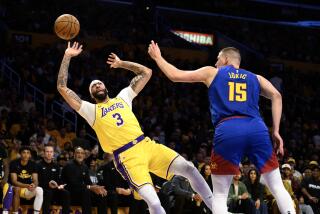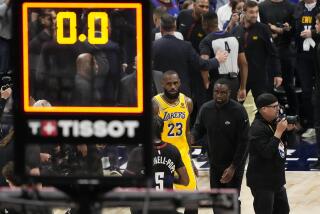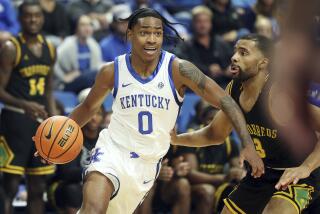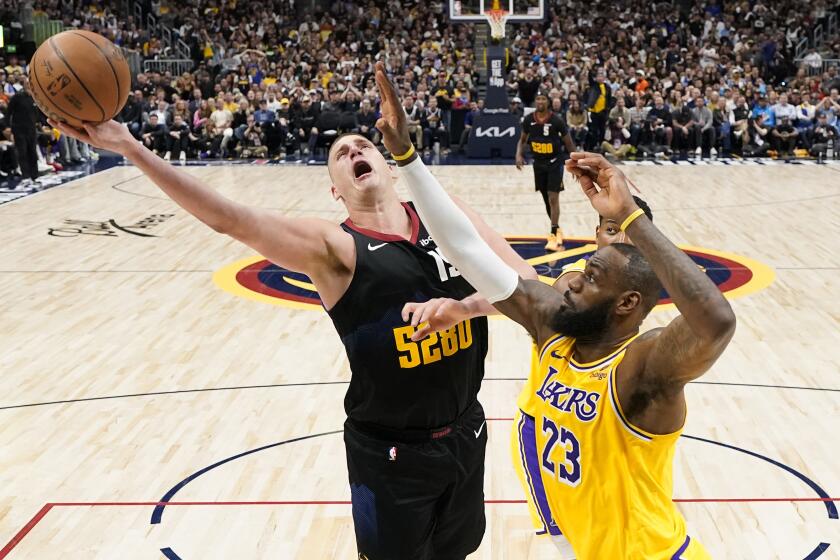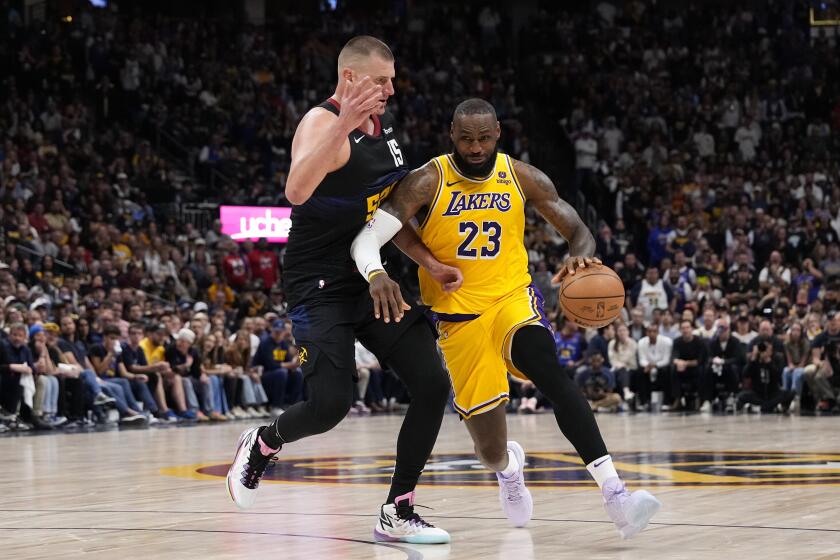Lakers’ Peacekeepers Caught in Crossfire
Rick Fox will long be the answer to a sports trivia question: Who was a co-captain and occasional fifth starter on a Los Angeles Laker team that featured Kobe Bryant, Shaquille O’Neal, Karl Malone and Gary Payton?
Fox has other distinctions too. He is one of the few American professional athletes to grow up in the Bahamas. He is so apt to forget his jacket or cellphone that the Lakers’ trainer, Gary Vitti, calls him a ditzy blond -- even though his unruly hair is as black as a pair of wraparound shades. On Hollywood’s team, Fox is the most Hollywood of all -- married to actress Vanessa Williams and angling toward his own career in film.
As his playing days reach a twilight, the 34-year-old forward is an elder statesman reconciled to his role in the “supporting cast,” as players call the hodgepodge of journeymen and rookies who perform in the shadow of bigger stars.
The Lakers are so dominated by Bryant and O’Neal that even Malone and Payton, two of the best ever, might be regarded as part of the secondary group -- an eclectic bunch that has struggled all season to contribute during games and hold a badly splintered team together in the locker room.
The mainstays include Fox, who hauls movie scripts to read on the road; Stanislav “Slava” Medvedenko, an expressionless 6-foot-10 forward from Ukraine who communicates with few outsiders as he learns to master English; Devean George, a small-college scoring whiz who toughened up under O’Neal’s pounding in practice and now starts at forward; and Derek Fisher, the shortest at 6 feet 1, who almost always travels in a suit and tie.
They and the others are part of an unusual team enduring one of the most tumultuous of seasons, due largely to the pending sexual-assault charges against Bryant and the animosities between Bryant and O’Neal. After winning Sunday, the Lakers trail the defending champion San Antonio Spurs, two games to one, in the second round of the National Basketball Assn. playoffs.
If they are eliminated, blame will shine everywhere -- including on the “role players,” for their inability to carry out the subtle tasks on the basketball floor that make victory possible.
Professional basketball has become surprisingly specialized. The Lakers rely mainly on Bryant and O’Neal for scoring, with secondary contributions from Malone and Payton. Remaining players are less important for points than for rebounding, defense and specific jobs that enable the Lakers’ multi-optioned triangle offense to work.
Fisher, for example, is an aggressive defender skilled at luring opponents into offensive fouls. He also has the ability to sink long three-point baskets, forcing the defense to spread out and opening space elsewhere for the Lakers’ attack.
Medvedenko fills in when Malone or O’Neal need a rest and concentrates on rebounds, hustling and getting open for mid-range jump shots. The smaller, quicker George brings different skills to the forward spot, proving effective in perimeter defense and the transition game, flashing from the defensive end to a fastbreak dunk or layup.
An informal pecking order governs who gets to shoot, and when. Most of the non-stars average fewer than 10 points a game, and are constrained by the coaches from trying to do too much. They focus on executing the passes and well-rehearsed movements that clear room for Bryant, or that get the ball to O’Neal at appropriate places on the floor.
In this series’ two losses, the Lakers’ supporting cast appeared overwhelmed, even confused, by the Spurs’ intensity and efficiency. Payton was badly outplayed by the youthful Tony Parker and reacted emotionally, telling reporters, “Y’all can blame me for everything, man, I don’t care.” On Sunday, as the Lakers regrouped and won a lopsided game at Staples Center, Payton won his matchup with Parker and a number of his teammates also performed strongly, including Malone, Fisher and Kareem Rush, a sinewy left-handed shooter whose quiet confidence belies his inexperience -- just two years in the league.
The game action is only the surface picture, however. The Lakers’ sociology runs much deeper -- to attitudes and values that are only visible elsewhere, in team meetings, on the plane, in the weight room, on the practice court. Most of those places are closed to all but the 12 athletes who make up the active roster, along with their coaches and a few others. In keeping with their own codes of privacy, they do not talk with outsiders about what happens behind the scenes.
“It’s just like a family,” said Payton, 35, who grew up in a tough Oakland neighborhood, spent most of his professional career as the star of the Seattle SuperSonics, and still talks in tough, rapid-fire street cadences. “Sometimes there be trouble, and it’s over.... We keep it in-house, let it go, and get back on the court and play.”
Information slips out in snippets and generalities -- enough, over recent years, to reveal a team torn and distracted by the schism between Bryant and O’Neal, and frustrated by personal agendas that disrupt their own unity on the basketball floor.
At the same time, many of the Lakers like one another. Members of an elite private club, they travel together, stay in first-class hotels, and share triumphs and losses, jokes and card games. Relationships are based to varying degrees on mutual interests, natural interpersonal chemistry, jealousies over playing time, attitudes about the coaching staff, and how they perceive and judge their more famous teammates.
Every player good enough to sign with the Lakers is one of the best in the world, and is paid accordingly. The typical Laker role player was perhaps the greatest in the history of his high school, then a collegiate standout. Now, among superstars, he might play only eight or 10 minutes -- not even a quarter of a game -- or finally get action as the clock runs down on a lopsided win.
Or not play at all.
The rub is more grating when the stars seem unsatisfied with their own, far larger roles, and they seem to put their own interests ahead of the team’s. Motivations are commonly second-guessed. Personal egos wage an ever-rippling battle with loyalty to the group. When the team is winning, harmony grows; losing feeds the divisive forces -- to a point, sometimes, where a strong leader such as Fox or Fisher feels motivated to cut through the rancor.
Former Laker Mark Madsen, now with the Minnesota Timberwolves, remembers a moment early last season involving Fox, when the Lakers were losing and bickering among themselves. Coach Phil Jackson called a meeting to air the grievances.
The crossfire became intense.
“It was an emotionally charged room,” Madsen said. “Everyone was being extremely direct ... expressing frustration about certain things -- frustrations we had with each other.”
Then Fox, ever candid, detailed the problems as he saw them. Madsen vividly recalls how the meeting ended -- with Fox getting personal.
“Rick finished by [saying], ‘I’m going to let some of you guys know how I feel about you’ ” -- a statement that caused teammates to brace themselves. “I think people were ready for something equally direct on a personal level,” Madsen said.
But instead, Fox pointed to several players -- those involved in the debate. “He said, ‘I love you ... I love you ... I love you’ ... and he left [the room]. He went to lift weights.”
A balloon had been punctured. The mood stayed tense for a while, but after five or 10 more minutes, when the meeting was over, guys came out laughing and joking, Madsen said. “Through the rest of the year,” he said, “guys referred back to that meeting.”
The Lakers failed to win a championship that season, losing in the playoffs to the Spurs, but Fox retains his leadership role, sharing the co-captaincy with Bryant and O’Neal. A thumb injury has limited Fox’s playing time in this year’s series. Still, he is often direct in discussing the team’s performances with the media, and he is outspoken about the cultural changes in the NBA that have emphasized individual stardom while eroding, in his opinion, the overall quality of play.
“You turn on the news and all they show are the highlights -- and everyone wants to be on the highlights,” Fox said. “We’re in a team game, a team atmosphere. Our athletes are in a mind-set of individuality, standing out above the team. When you’re talking about an individual star, he has to live up to his individual hype.... [Fans] will expect him to score 30 points, get five dunks, whatever -- however he’s marketed by this league. A star will tell you, ‘They’re here to see me, not you, so pass me the ball.’ ”
Good teams manage to put aside selfish goals as the playoffs near, Fox said, but he has come to view the first three months as “the individual phase of the NBA,” with players competing for status in ways the fans may not always realize.
“Everybody’s worked all summer at their games, and they step into the season with things they want to happen for them,” he said. “They may want to average 30 minutes a game. They may want to make an All-Star team. They may want to be an all-defensive player. They may want to lead the league in rebounding. They may want to lead the league in scoring. Everybody has these goals. It may be a contract year, so it may be to get a new contract. It may be, in some cases, to win a championship.
“Whatever those individual goals are,” Fox said, “they all come into training camp and they clash. I guarantee you there are a whole lot more individual goals out there than team goals.”
Malone and Payton joined the Lakers this season with individual goals that seemed compatible with the team: Each wanted to win a championship before retiring, even if it meant taking a substantial salary cut and playing in the shadow of other stars. The two men, despite strikingly different backgrounds, had become good friends and are also friends of O’Neal, who helped persuade them to come.
Malone, 6 feet 9, chiseled and broad-shouldered, is the oldest Laker at 40, a dignified and slow-talking forward from tiny Bernice, La. He drives an 18-wheeler and owns a pack of hunting dogs. Zealous about fitness, Malone is often at work even after practice, putting in time on a step machine, and seems a stabilizing force in the Lakers’ locker room. After games he sits hunched at his corner cubicle, wrapped in a towel, ice packs taped to his knees, and speaks quietly about what the team needs, or what it did right.
“I think the guys are realizing how much easier things can be if we all just give a little,” he said during a winning streak.
Payton said he hit it off with Malone partly because they play the same way -- aggressive, bruising: “We’re not out there to be your friend.”
They enliven the games of spades that take place on the Lakers’ chartered jet. Payton spills one-liners and endlessly rags on his teammates. Both stars have improved the locker room chemistry, coaches say, but Payton’s arrival placed some strain on Fisher, who went from starter to second string.
As the team labored, Payton and Fisher both suffered. Payton complained publicly in March about his reduced minutes. The studious, soft-spoken Fisher seemed to acquaintances to be unhappy, but said nothing until late in the season, when he admitted the adjustment was hard.
By then, he was playing more, and also taking it upon himself to voice support for the beleaguered Bryant. The most solitary of the Lakers had been accused of barely trying in a crucial game against the Sacramento Kings in the aftermath of earlier criticisms for shooting too much. Bryant was also attending a series of hearings in his rape case.
Fisher spoke up for him one day, saying, “I’d like to give him ... credit for remaining as tough and as driven and as focused as he [has],” and later, engulfed by reporters at the Lakers’ practice gym in El Segundo, elaborated on why he was moved to speak.
“I just felt like he deserved it,” Fisher said, appreciative that Bryant, who could have taken the year off to deal with his legal problems, instead became a catalyst for the team’s strong second-half run.
As an afterthought -- one that offered a revealing glimpse at how the role players deal with the superstars -- Fisher said he decided against expressing the nice sentiments directly to Bryant.
“I thought about going to him one-on-one, but, you know, we’re not big on mushy stuff around here,” Fisher said. “We’re all grown men, so [we don’t want] too much mushy stuff.”
On the road, a few Lakers like to hang out together. O’Neal, Payton, Malone and Bryon Russell are part of a clique. Russell, a former teammate of Malone in Utah, wears gold chains and smiles often, as if enjoying the glamour of NBA life; he also hangs out with Fisher and George. Bryant joins the joshing on the plane and team buses far more than he used to, but remains largely apart from any group.
Kingly, good-humored Horace Grant, a 6-foot-10 forward now out because of injury, wears suits on the sidelines and savors the waning days of a long career.
Medvedenko is at last getting time on the floor despite an Achilles’ tendon injury and said he was no longer frustrated as in his first three seasons, when he was lonely and often thought of quitting. He still calls his family once a week, but has met people from his homeland in cities around the league, and meets some for dinner when the Lakers are in town.
The younger guys -- Rush, Luke Walton and Brian Cook -- partner up, bound by the pressures of learning the pro game.
“There’s a lot of pressure,” said Walton, a rookie who earns the lowest Laker salary, $350,000. “It’s a lot different than college. In college, I knew if I made a mistake I was still going to stay on the court.”
The Lakers are light years removed from the University of Arizona. These days, if he makes a mistake -- fails to screen out for a rebound, gets sloppy with his passes -- he is sure to be back on the bench, no place to carve out an enduring spot in the league.
But he enjoys these Lakers, doesn’t see the animosity and back-biting so often reported in the media, the joyless drudgery he had feared upon entering the NBA.
“I heard so many stories where you don’t even talk to your teammates -- you go to practice, talk to them on the court, and that’s it until the next day,” said Walton, the tousle-haired son of Hall of Famer Bill Walton.
“You kind of hear in professional sports it’s all business -- get your job done and go home. One of the great things about this team, they’re a lot of fun. Everyone’s always hanging out with each other, telling jokes, getting on each other. This is a lot more like a college team than I expected it would be.”
More to Read
All things Lakers, all the time.
Get all the Lakers news you need in Dan Woike's weekly newsletter.
You may occasionally receive promotional content from the Los Angeles Times.
